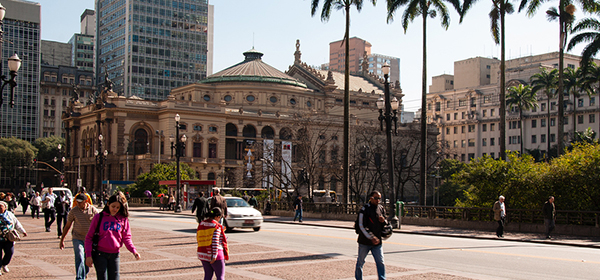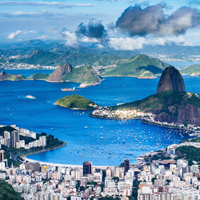Retire in Sao Paulo Guide
Summary: If Sao Paulo is on your retirement radar, our detailed Retire in Sao Paulo Guide is your go-to resource. Delve into the crucial aspects of life here, including living costs, climate, housing options, healthcare services, and residency procedures. We also explore the city's social dynamics, volunteering scenes, transportation, and how walkable its neighborhoods are.

Sao Paulo is a vibrant city that offers a unique blend of cultural richness, modern amenities, and natural beauty. It's a popular retirement destination for international retirees who are drawn to its warm climate, affordable cost of living, and high-quality healthcare. However, like any city, it also presents its own set of challenges, such as language barriers and navigating the local bureaucracy.
Cost of Living
One of the main attractions of retiring in Sao Paulo is the affordable cost of living. While it's more expensive than some other Brazilian cities, it's still significantly cheaper than many North American and European cities. Housing, groceries, and services are all reasonably priced, allowing retirees to enjoy a comfortable lifestyle without breaking the bank.
Climate
Sao Paulo enjoys a tropical monsoon climate, with warm, wet summers and mild, dry winters. The average temperature ranges from 20°C to 28°C, making it an ideal destination for those who enjoy warm weather. However, the city does experience heavy rainfall during the summer months, so it's important to be prepared for this.
Healthcare
Sao Paulo is home to some of the best hospitals in Brazil, offering high-quality medical care at a fraction of the cost of many developed countries. Many doctors and medical staff speak English, making it easier for international retirees to communicate their health needs.
Public Healthcare System
While Brazil has a public healthcare system, it's often overcrowded and under-resourced. As a result, many retirees opt for private health insurance, which offers faster access to medical care and a wider range of services. However, it's worth noting that even private healthcare in Brazil is significantly cheaper than in many other countries.
Residency Options for Retirees
Brazil offers a retiree visa, known as the Permanent Visa for Retirees, which allows international retirees to live in the country if they can prove a regular income of at least $2,000 per month. This visa is renewable every two years.
Parks and Recreational Activities
Sao Paulo offers a wealth of recreational activities for retirees. The city is home to numerous parks, such as Ibirapuera Park and Villa-Lobos Park, where retirees can enjoy walking, cycling, and picnicking. The city also boasts a vibrant arts scene, with numerous galleries, theaters, and music venues.
Restaurants
Food lovers will be spoilt for choice in Sao Paulo. The city offers a wide range of dining options, from traditional Brazilian fare at places like Casa do Norte and Bar do Mané, to international cuisine at restaurants like Rascal and Figueira Rubaiyat.
Learning the Language
While many Brazilians speak English, learning Portuguese can greatly enhance your experience in Sao Paulo. There are numerous language schools in the city, such as Fast Forward Language Institute and PUC-SP Idiomas, that offer Portuguese classes for foreigners.
Local Culture
Brazilians are known for their warmth and friendliness, and Sao Paulo is no exception. The city is a melting pot of cultures, with a diverse population that is generally welcoming to foreigners. However, like any big city, it's important to be aware of your surroundings and take precautions to stay safe.
Housing Options
Most retirees in Sao Paulo opt to live in apartments, which are plentiful and affordable. Popular neighborhoods for retirees include Jardins, Vila Nova Conceição, and Higienópolis, which offer a mix of residential tranquility and urban amenities.
Transportation
Sao Paulo has an extensive public transportation system, including buses, trains, and a metro system. Many retirees find that they can get by without a car, especially if they live in the central city. However, traffic can be heavy, so it's important to plan your journeys accordingly.
About the Author
 Betsy Burlingame is the Founder and President of Expat Exchange and is one of the Founders of Digital Nomad Exchange. She launched Expat Exchange in 1997 as her Master's thesis project at NYU. Prior to Expat Exchange, Betsy worked at AT&T in International
and Mass Market Marketing. She graduated from Ohio Wesleyan University
with a BA in International Business and German.
Betsy Burlingame is the Founder and President of Expat Exchange and is one of the Founders of Digital Nomad Exchange. She launched Expat Exchange in 1997 as her Master's thesis project at NYU. Prior to Expat Exchange, Betsy worked at AT&T in International
and Mass Market Marketing. She graduated from Ohio Wesleyan University
with a BA in International Business and German.
Some of Betsy's articles include 12 Best Places to Live in Portugal, 7 Best Places to Live in Panama and 12 Things to Know Before Moving to the Dominican Republic. Betsy loves to travel and spend time with her family. Connect with Betsy on LinkedIn.
Additional Information:
- Public Transportation in Sao Paulo
- Best Neighborhoods for Single Digital Nomads Living in Sao Paulo
- Pros & Cons of Living in Sao Paulo
- Fun Classes for Expats Living in Sao Paulo
- Best Neighborhoods for Retirees in Sao Paulo
- Best Neighborhoods for Families in Sao Paulo
- Best Neighborhoods for Single People in Sao Paulo
- Best International Schools and Bilingual Schools in Sao Paulo
- 7 Weekend Getaways for Digital Nomads Living in Sao Paulo
- Best Bookstores and Libraries in Sao Paulo
- Fun Classes for Expats Living in Sao Paulo
- Public Transportation in Sao Paulo
- Best Markets in Sao Paulo
- Retire in Sao Paulo Guide
- 7 Tips for Living in Sao Paulo
- Pros & Cons of Living in Sao Paulo
- Tips for Expats Driving in Sao Paulo
- Cost of Living in Sao Paulo
- Health Care in Sao Paulo
- Discover the Best of Sao Paulo
- 5 Tips For Living in Sao Paulo
- Healthcare & Health Insurance in Brazil
- Best Places to Live in Brazil
- Real Estate in Brazil
- Pros & Cons of Living in Brazil
- 10 Things to Know Before Moving to Brazil
- What It's Like Living in Sao Paulo
- Pros and Cons of Living in Brazil 2025



